Transforming observability with AI Assistant, OTel standardization, continuous profiling, and enhanced log analytics
Elastic Observability delivers accurate insights with AI Assistant, provides the best solution standardized on OpenTelemetry (OTel), expands to include profiling, and enhances log analytics to accelerate problem resolution.

A more modern era of observability is being ushered in with the emergence of AI and generative AI. As these AI technologies go mainstream, expect observability to advance from a manual, reactive process to a more proactive AI-driven approach with auto-diagnosis of issues followed by remediation.
Long gone are the days of monolithic applications running in data centers, where software updates were infrequent events. Operations teams relied on server, network, and storage tools to monitor their tech silos, manually analyzed data, and used an on-call conference bridge with others to identify, triage, and resolve issues. With the advent of cloud along with its complexity, abstraction of infrastructure, and faster development cycles, operations and SRE teams needed observability to help address these new “unknown unknowns.” And while observability tools have made connecting the dots a bit easier, the overall effort is still manual and has been encumbered with the challenge of tool silos and exponentially increasing costs.
With years of experience and innovation in AI and machine learning (ML), vector databases, elasticsearch Relevance EngineTM (ESRE), and Retrieval Augmented Generation (RAG), Elastic is well positioned to lead IT teams into this new era of AI-powered observability — bringing metrics, logs, traces, and profiling into one single platform to deliver actionable insights.
As Kelly Fitzpatrick, senior analyst at RedMonk, notes:
Observability in 2023 is a challenge of navigating transformative technologies and emerging standards while also managing increasingly complex systems. Elastic aims to help organizations meet these challenges with tools designed to adapt to this ever-evolving operational landscape. With its AI Assistant for Observability, along with a reinforced commitment to OpenTelemetry and the general availability of Universal Profiling, Elastic endeavors to enable SRE teams to better manage the cost and complexity of their systems.
Enhance operational intelligence with context-aware, actionable insights using the interactive Elastic AI Assistant
Elastic has leveraged its years of machine learning expertise and integration with generative AI platforms to transform observability with relevant and context-aware AI-powered insights. The Elastic AI Assistant for Observability (now in technical preview), powered by the elasticsearch Relevance Engine (ESRE), enhances the understanding of application errors, log messages, and alerts while offering suggestions for optimal code efficiency. Additionally, Elastic AI Assistant’s interactive chat interface allows SREs to interactively chat and visualize all relevant telemetry in one place, while also leveraging proprietary, internal information for remediation.

Elastic allows users to provide private data to the assistant, such as runbooks, a history of past incidents, case histories, and more. Using an Inference processor powered by the Elastic Learned Sparse EncodeR (ELSER), the Assistant gets access to the most relevant data for answering specific questions or performing tasks. The assistant can learn and grow its knowledge base with continued use and guided learning. SREs can teach the assistant about a specific problem so it can provide support for that scenario in the future and assist in composing outage reports, updating runbooks, and enhancing automated remediation. SREs can pinpoint and resolve issues faster and more proactively, through the combined power of the Elastic AI Assistant and machine learning capabilities, by eliminating cumbersome and manual data retrieval across silos.
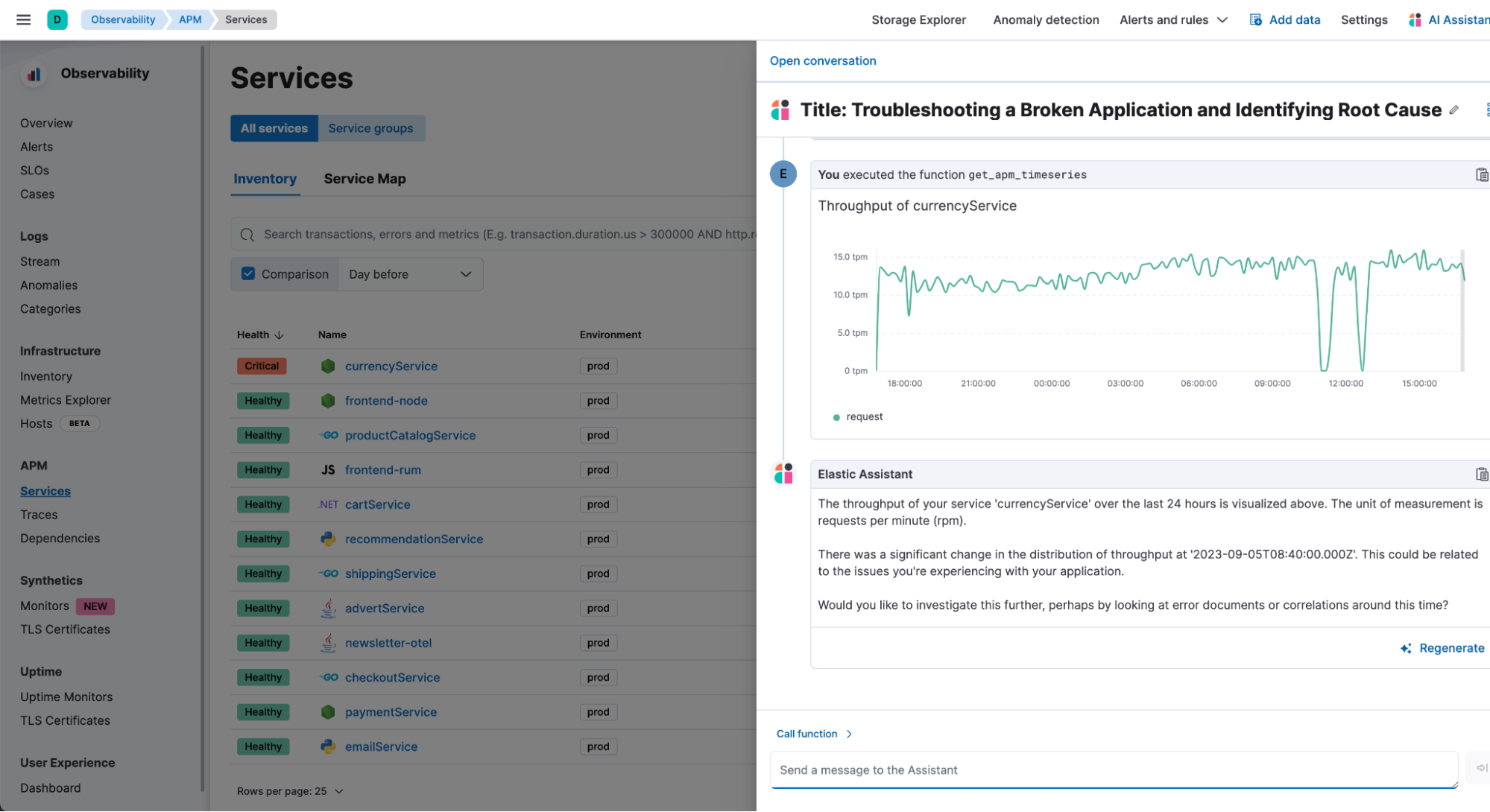
By incorporating internal, business-specific information with the LLMs, Elastic AI Assistant delivers highly relevant results helping accelerate problem identification and resolution and turbocharging AIOps for your teams.
Learn more about how the Elastic AI Assistant provides context-aware insights to solve observability problems.
Improve operational efficiency with standardization on OpenTelemetry, enhanced log analytics, and a new signal, Universal Profiling
Elastic’s further commitment to OpenTelemetry
Elastic offers native support for OpenTelemetry and is building for a future where most users will choose OTel as their schema and data collection architecture for Elastic Observability and Elastic Security. Building on its contribution of Elastic Common Schema (ECS) to OpenTelemetry (OTel), Elastic is solidifying its commitment and investment in establishing OpenTelemetry as the industry standard. This enables customers to adopt open standards and realize the benefits of open ingestion. Elastic is continuing to make further contributions to OpenTelemetry, which will enable SREs with standardized methods to ingest metrics, logs, and traces, to reduce costs, increase visibility, and build vendor independence.
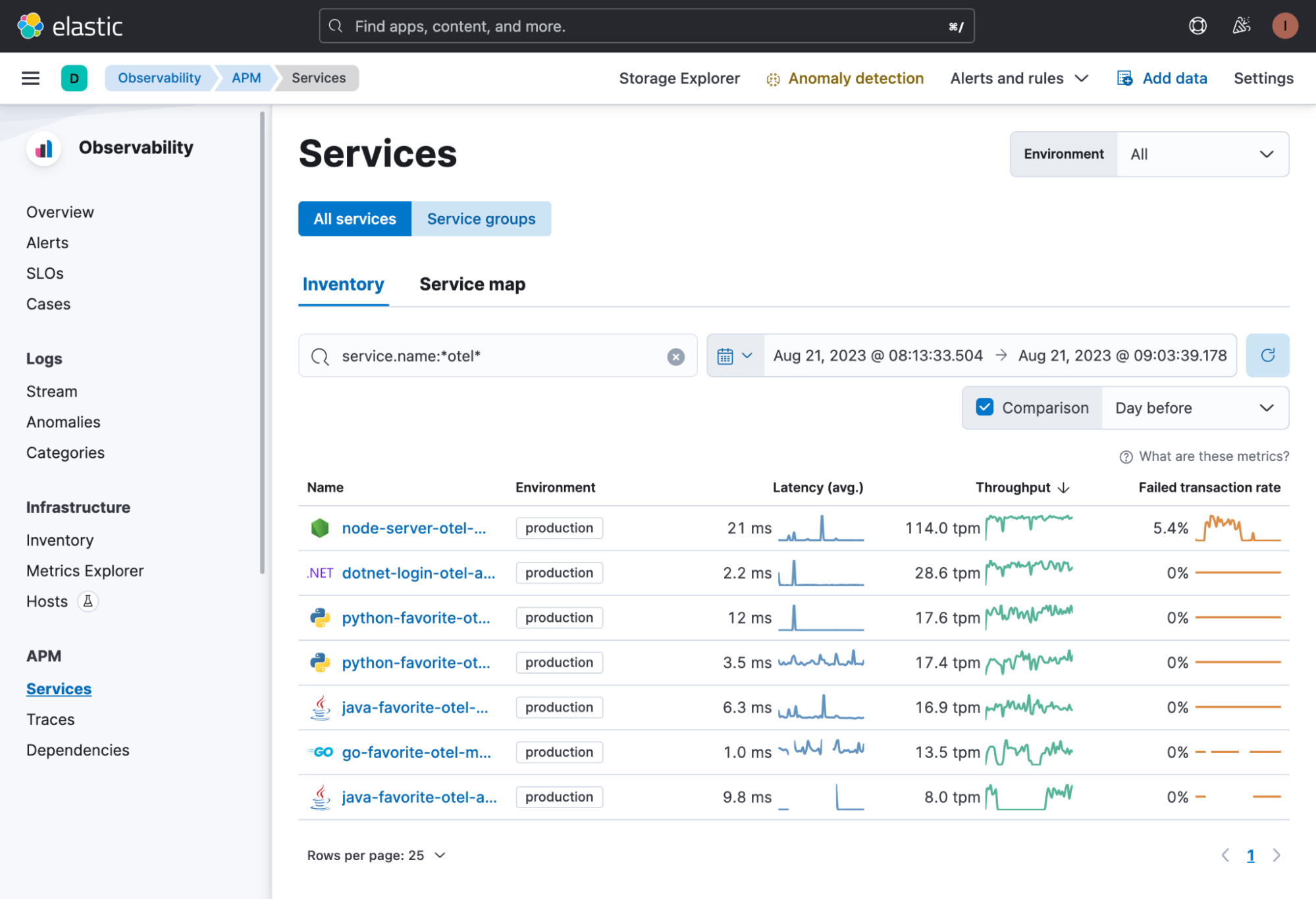
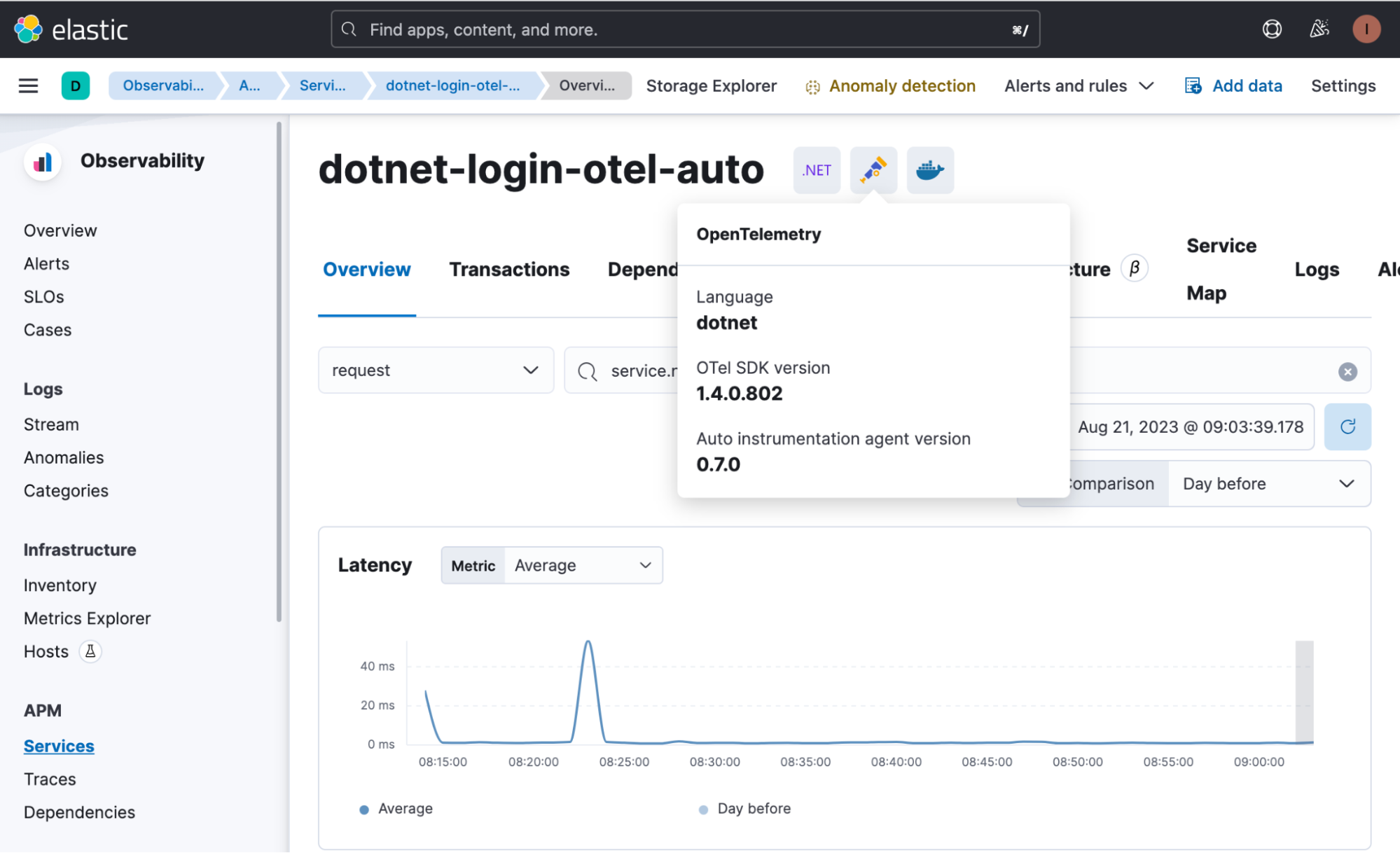
Learn how to use OpenTelemetry and Elastic to instrument popular languages, employ a standardized open log format (ECS), and analyze data with AI and ML to achieve vendor independence with OpenTelemetry.
Optimize computational efficiency with Universal Profiling
Elastic’s Universal ProfilingTM — now generally available — allows businesses to achieve cost control, resource optimization, and sustainable growth. Complex cloud-native environments often create blind spots for SRE teams since many components cannot be instrumented. Universal Profiling, always-on with zero instrumentation and low overhead, pinpoints performance bottlenecks with visibility into third-party libraries allowing expedited issue resolution, while also enabling organizations to reduce cloud costs and lower the carbon footprint of their infrastructure. Universal Profiling empowers SREs with a deep understanding of resource-consuming code to help optimize compute cycles and enable the swift identification and resolution of bottlenecks.
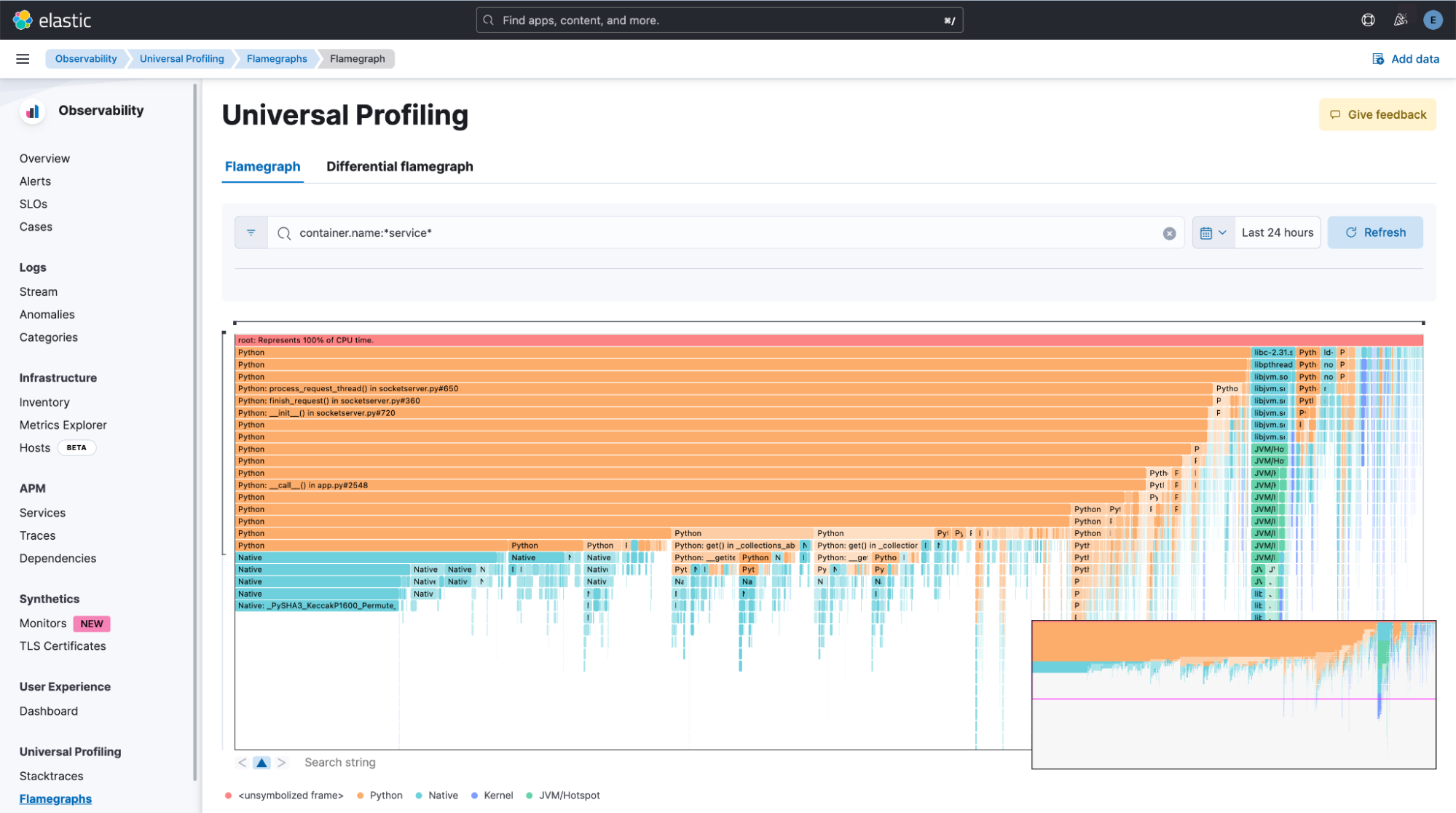
Enhanced log analytics journey
Elastic’s enhanced log analytics journey provides SREs with the ability to automatically categorize logs through its unique log routing processor, further processing and enriching log data, and to support log analysis with AI. Using Elastic’s machine learning algorithms, SREs get automated analysis for log spikes, pattern detections, anomaly discovery, and change point detection. Elastic Observability’s log ingestion now supports open ingestion with OpenTelemetry and hundreds of turnkey integrations and custom formats, all with optimal cost and performance. Elastic’s enhanced logs journey results in lower storage costs, heightened operational efficiencies, and reduced time to resolution.
Learn more about the logging journey and how Elastic helps.
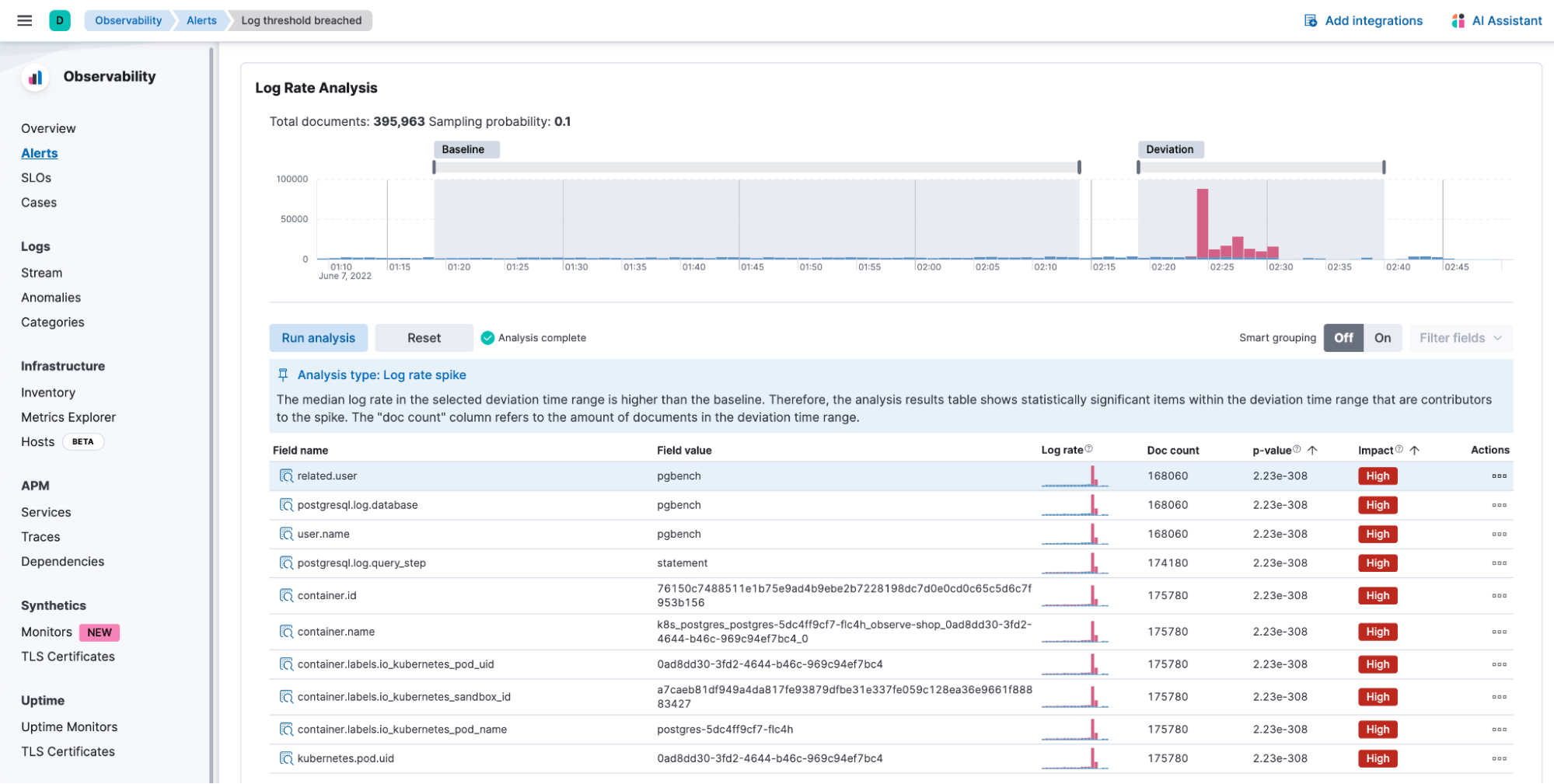
Delivering on a vision for the future of observability
Elastic continues to innovate and deliver on its full stack observability solution to help SRE teams manage complex hybrid and multi-cloud environments with actionable insights. Elastic’s investment in AI and machine learning along with a unified, open, and flexible platform continues to deliver on customer needs and will help transform the future of observability. To learn more about our thoughts, listen to this discussion with Kelly Fitzpatrick, senior analyst at RedMonk.

The release and timing of any features or functionality described in this post remain at Elastic's sole discretion. Any features or functionality not currently available may not be delivered on time or at all.
In this blog post, we may have used or referred to third party generative AI tools, which are owned and operated by their respective owners. Elastic does not have any control over the third party tools and we have no responsibility or liability for their content, operation or use, nor for any loss or damage that may arise from your use of such tools. Please exercise caution when using AI tools with personal, sensitive or confidential information. Any data you submit may be used for AI training or other purposes. There is no guarantee that information you provide will be kept secure or confidential. You should familiarize yourself with the privacy practices and terms of use of any generative AI tools prior to use.
Elastic, elasticsearch, ESRE, elasticsearch Relevance Engine and associated marks are trademarks, logos or registered trademarks of elasticsearch N.V. in the United States and other countries. All other company and product names are trademarks, logos or registered trademarks of their respective owners.

